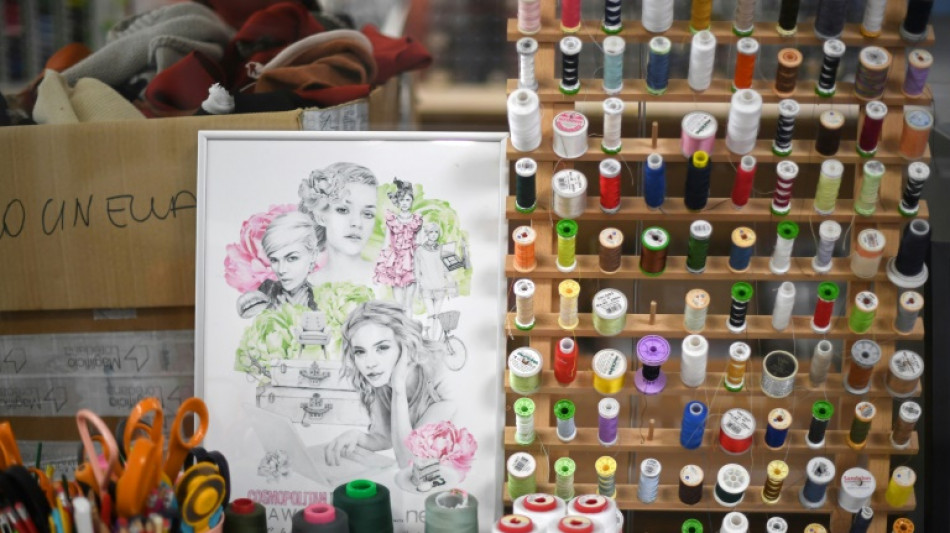
-
 Williams 'on the back foot' after missing Barcelona: Albon
Williams 'on the back foot' after missing Barcelona: Albon
-
Real Madrid submit evidence to UEFA in Vinicius racism probe

-
 Olympics rev up Milan's renewal but locals fear price to pay
Olympics rev up Milan's renewal but locals fear price to pay
-
Cardona Coll, Fatton win Olympic-debuting ski mountaineering sprint golds

-
 MSF will keep operating in Gaza 'as long as we can': mission head
MSF will keep operating in Gaza 'as long as we can': mission head
-
Russian Filippov wins first medal at Milan-Cortina Games for individual neutral athletes

-
 Italian Milan takes sprint honours at UAE Tour
Italian Milan takes sprint honours at UAE Tour
-
Dozens killed in jihadist attacks in northwest Nigeria

-
 Zimbabwe unbeaten in T20 World Cup after six-wicket Sri Lanka win
Zimbabwe unbeaten in T20 World Cup after six-wicket Sri Lanka win
-
Postecoglou admits taking Nottingham Forest post a 'bad decision'

-
 Switzerland's Fatton wins women's ski mountaineering sprint on Olympic debut
Switzerland's Fatton wins women's ski mountaineering sprint on Olympic debut
-
Kinghorn, Van der Merwe return for Scotland against Six Nations strugglers Wales

-
 Repsol says could boost Venezuela oil output over 50% in 12 months
Repsol says could boost Venezuela oil output over 50% in 12 months
-
UN says Israeli actions raise 'ethnic cleansing' fears in West Bank, Gaza

-
 Arteta tells faltering leaders Arsenal to harness Wolves 'pain' against Spurs
Arteta tells faltering leaders Arsenal to harness Wolves 'pain' against Spurs
-
Crowley gets nod for Irish as Prendergast drops out

-
 Unbeaten Swiss to meet Great Britain in Olympic men's curling semis
Unbeaten Swiss to meet Great Britain in Olympic men's curling semis
-
UK police arrest ex-prince Andrew on suspicion of misconduct

-
 Oil extends gains on US-Iran tensions, Europe stocks slide
Oil extends gains on US-Iran tensions, Europe stocks slide
-
Former prince Andrew, a historic downfall

-
 Sri Lanka post 178-7 against Zimbabwe ahead of T20 Super Eights
Sri Lanka post 178-7 against Zimbabwe ahead of T20 Super Eights
-
OpenAI's Altman tells leaders regulation 'urgently' needed
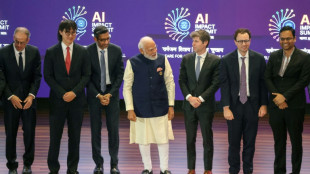
-
 US renews threat to leave IEA
US renews threat to leave IEA
-
Liverpool boss Slot says Isak in 'final stages of rehab'

-
 Airbus ready to build two new European fighter jets if 'customers' ask
Airbus ready to build two new European fighter jets if 'customers' ask
-
UN Sudan probe finds 'hallmarks of genocide' in El-Fasher

-
 Costelow starts, Hamer-Webb makes Wales debut in Six Nations clash with Scotland
Costelow starts, Hamer-Webb makes Wales debut in Six Nations clash with Scotland
-
Facing US warnings, Iran defends right to nuclear enrichment

-
 Ex-South Korea leader Yoon gets life in prison for insurrection
Ex-South Korea leader Yoon gets life in prison for insurrection
-
OpenAI's Altman says at India summit regulation 'urgently' needed
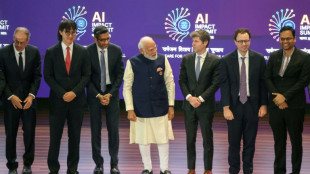
-
 British couple held in Iran sentenced to 10 years
British couple held in Iran sentenced to 10 years
-
West Indies ease past Italy to tune up for T20 Super Eights

-
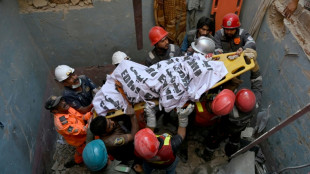 At least 16 killed after building collapses in Pakistan following blast
At least 16 killed after building collapses in Pakistan following blast
-
Summit photo op fails to unite AI startup rivals

-
 OpenAI's Altman says world 'urgently' needs AI regulation
OpenAI's Altman says world 'urgently' needs AI regulation
-
Horror comics boom in our age of anxiety

-
 Turkey fires up coal pollution even as it hosts COP31
Turkey fires up coal pollution even as it hosts COP31
-
London fashion week opens with tribute to one of its greats

-
 Ex-S.Korea leader Yoon gets life in prison for insurrection
Ex-S.Korea leader Yoon gets life in prison for insurrection
-
Pea soup, veggie mash contest warms up Dutch winter
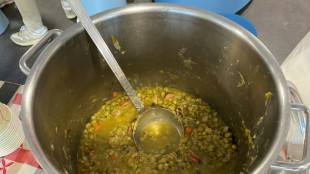
-
 South Korea's Yoon: from rising star to jailed ex-president
South Korea's Yoon: from rising star to jailed ex-president
-
Private companies seek to import fuel amid Cuban energy crisis

-
 India search for 'perfect game' as South Africa loom in Super Eights
India search for 'perfect game' as South Africa loom in Super Eights
-
India's Modi calls for inclusive tech at AI summit
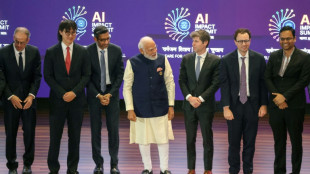
-
 Airbus planning record commercial aircraft deliveries in 2026
Airbus planning record commercial aircraft deliveries in 2026
-
Elections under fire: Colombia endures deadliest campaign in decades

-
 Traore backs 'hungry' Italy against France in Six Nations
Traore backs 'hungry' Italy against France in Six Nations
-
All-rounder Curran brings stuttering England to life at the death

-
 South Korea court weighs death sentence for ex-president Yoon
South Korea court weighs death sentence for ex-president Yoon
-
Tech chiefs address India AI summit as Gates cancels


Fast-fashion fallout: young people in UK spurred into sewing
From jogging outfits to summer dresses, Lea Baecker has stitched together most of her wardrobe herself from inside her London flat, part of a burgeoning number of young amateur seamstresses.
Like many others in the growing horde of sew-it-yourself enthusiasts, she has grown increasingly disillusioned with the retail clothing industry, viewing it as too destructive.
"My main motivation was not having to buy ready-to-wear clothes anymore because I didn't want to support fast fashion," Baecker, 29, told AFP, referring to clothes made and sold cheaply to be thrown away after minimal use.
The doctoral student in neuroscience only started sewing in 2018, beginning with small bags before moving on to clothes.
Four years on, she estimates about 80 percent of clothes in her wardrobe are homemade, from pyjamas to long fleece coats, as well as jeans made with denim scraps scalped from relatives.
Baecker now buys new clothes "very rarely", she added, wearing one of her self-made long, hand-sewn dresses.
- 'Scale' -
The fashion and textile industry is the third most polluting sector globally after food and construction, accounting for up to 5 percent of greenhouse gas emissions, according to a 2021 report by the World Economic Forum.
Low-cost fashion retailers are regularly criticised for their waste and pollution, as well as the pay conditions imposed on their workers.
Tara Viggo knows fast fashion only too well, having worked in the industry for 15 years as a pattern maker.
"I realised the scale that the fashion industry was working at and it was a bit terrifying," she told AFP.
In 2017, Viggo decided to start creating her own patterns -- the blueprint drawings on paper before garments are made.
She started out small, selling only around one set of patterns per year, a far cry from the four a day that she would sometimes churn out in the ready-to-wear industry.
Viggo conceded independent operators like her were only tiny competitors to the big brands, but insisted they still could have a meaningful impact.
"The more of us that do (it), the better," she said.
"It's like a trigger... People start to look at where their consumption" is, she added noting it also made you aware of the true costs involved.
"Once you know how to sew your own clothes, you can't fathom that a shirt should be £3 ($4.10, 3.60 euros) anymore."
- 'More young people' -
Viggo's "Zadie" jumpsuit is now a top seller on "The Fold Line", an online platform selling independently produced sewing patterns, according to its co-founder Rachel Walker.
Since its launch in 2015, the website has grown from about 20 designers to more than 150 today.
Rosie Scott and Hannah Silvani, who run a London workshop selling fabrics from fashion designers' unsold stock, have also seen the resurgence in sewing's popularity, particularly among young people.
"The clients have changed," said Scott.
"More young people have shown interest in sewing -- young people who are really interested in making their own clothes and making them sustainably."
Women make up more than 90 percent of the clientele, she also noted.
Customers can choose from some 700 designer fabrics, sold from £8 a metre for cotton voile -- a sheer, lightweight cotton fabric -- to £110 for the same length of lace.
Orders soared during the pandemic and are still going strong despite the lifting of restrictions, Scott said.
- Instagram key -
The sector's explosive growth would not have been possible without Instagram, where the sewing community has made a pastime once seen as unfashionable much more trendy.
The photo-sharing platform "is really important", Baecker said, allowing sewists to post images of their designs and engage with each other.
This is what prompted her to join the social network, where she now regularly shares her latest works.
"I found each pattern has a specific hashtag that you can look up and then you can see a lot of different people wearing the same pattern and you can imagine how it can look on yourself," she explained.
For example, Viggo's #Zadiejumpsuit -- which comes in velvet or cotton, with or without sleeves -- has been tagged in almost 11,000 posts.
Meanwhile, the hashtag #handmadewardrobe features in more than 900,000 posts.
With Baecker sharing so many of her creations, she has also inspired friends to join the growing sewing revolution.
"That is my proudest achievement... getting my friends into sewing as well," she said.
Ch.Kahalev--AMWN



